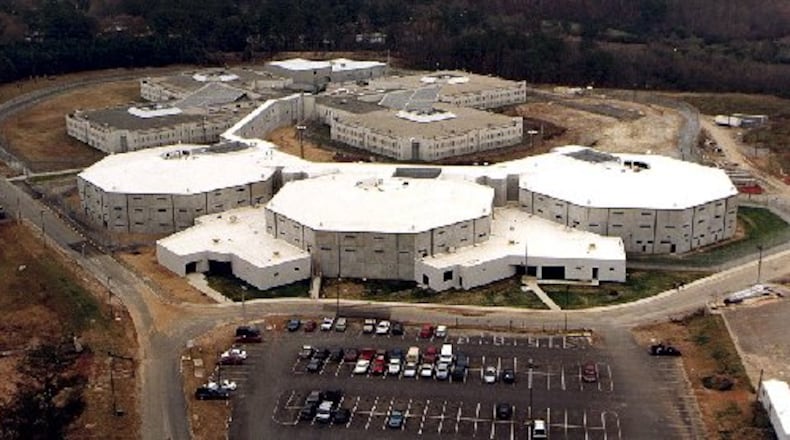The Cobb County Medical Examiner’s Office has finalized the autopsies of two inmates who died after experiencing medical emergencies at the Adult Detention Center.
The autopsies on Steven Davis and William John Kocour show the manner of death for both men to be natural causes. However, that’s where the similarities end.
The Medical Examiner’s Office classified Davis’s cause of death to be undetermined while Kocour died from cirrhosis of the liver, according to the reports released by the office.
The two men are among seven Cobb County Adult Detention Center inmates who have died after experiencing medical emergencies at the facility. The deaths have sparked criticism from residents, local activists and civil rights organizations, which are calling on Sheriff Neil Warren to address their concerns about medical care for inmates and jail staffing levels.
RELATED | Outcry over Cobb County jail deaths, conditions grows louder
According to the medical examiner’s report, Davis was alive at 5:04 a.m. June 8 when he “stood up for a head count.” Afterward, Davis on was on his top bunk when his roommate reported he appeared to be having a seizure.
“The cellmate held him in the bed as he was concerned that the decedent might fall out of bed,” the medical examiner’s report said.
Jail personnel responded to the cell and found Davis “breathing with snorting type respiration,” but he did not respond to verbal commands or stimuli. He was transported to WellStar Kennestone Hospital where he was pronounced dead.
The Medical Examiner's report notes Davis appeared to be a healthy male with no injuries, other than sternum and rib fractures that occurred when first responders tried to resuscitate him. His blood also tested negative for alcohol and drugs, although Davis had a history of prior head trauma and mental illnesses, according to the autopsy.
No evidence of foul play was present, the report states.
RELATED | Families of inmates in Cobb Detention Center recount frustrations
"However, the investigation revealed a history of seizure like activity which progressed to unresponsiveness that later progressed to a cardiac rhythm requiring AED activation," says the report, referring to the defibrillator machine that sends an electric pulse to the heart. "The initial 'seizure like activity' may have represented a true seizure or a cardiac dysrhythmia mimicking a seizure."
Destiny Davis, Steven Davis’ daughter, said it was “heartbreaking that my dad died in jail.” Her father, she said, was her best friend and that she told him everything.
“I think about him everyday,” she said.
She also criticized the Sheriff’s Office for not allowing her family to view her father’s body after he was pronounced dead. They finally were able to see his body when he was released to the funeral home.
“I didn’t even get a chance to see my dad until we were in the process of planning his funeral,” she said.
Kocour died in hospice care
The autopsy report for William Kocour appears to be more conclusive, but a relative is concerned his nephew did not receive proper medical attention.
While at the jail, the 63-year-old complained that he was not feeling well and was transported to WellStar Cobb Hospital. His health continued to decline, and he was transported to WellStar Community Hospice where he died Sept. 10, the report says.
Cobb County Sheriff’s Office spokesman Glenn Daniel said the department’s investigation remains active, so he could not release the date Kocour was transported to the hospital and transferred to hospice care.
Kocour’s past medical history was “significant for end-stage liver disease due to cirrhosis of the liver” and other conditions, the report said. The autopsy also indicated his body had no external injuries, and test results came back negative for alcohol and “commonly abused drugs,” the report adds.
READ | Cobb reports 7 deaths in its jail in the past year
Kocour’s uncle, Tom Carlson, said he has doubts that Kocour was receiving the medications he needed to remain in good health. Carlson said he became suspicious when Kocour’s condition deteriorated so quickly after he was taken to the hospital. Once he learned his nephew had been arrested last year, Carlson said he sent to the Sheriff’s Office a list of medicines Kocour was taking.
“They can’t say they didn’t know what he was supposed to be getting,” he said.
Carlson's concerns about a relative not receiving proper medical care isn't the first time this claim has been made by surviving relatives and attorneys representing families of inmates. Timothy Gardner, the attorney representing Kevil Wingo, a 36-year-old inmate who died Sept. 29 after he experienced what the sheriff's office called a "medical emergency," previously told The Atlanta Journal-Constitution that "improper, poor medical care," inadequate staffing and the lockdown are contributing factors in Wingo's death.
Don Emory, the father of 33-year-old Bradley Emory, an inmate who the Medical Examiner's Office said died from suicide, called the jail several times to inform sheriff's deputies that his son was suicidal before he took his life.
Carson said he believed his nephew, who suffered from mental illnesses, should have been transported to an institution rather than a detention center.
“It was a tough situation,” he said. “He needed to be in an institution. It would have been a lot better for him.”
Like Cobb County News Now on Facebook | Follow on Twitter
About the Author
Keep Reading
The Latest
Featured




